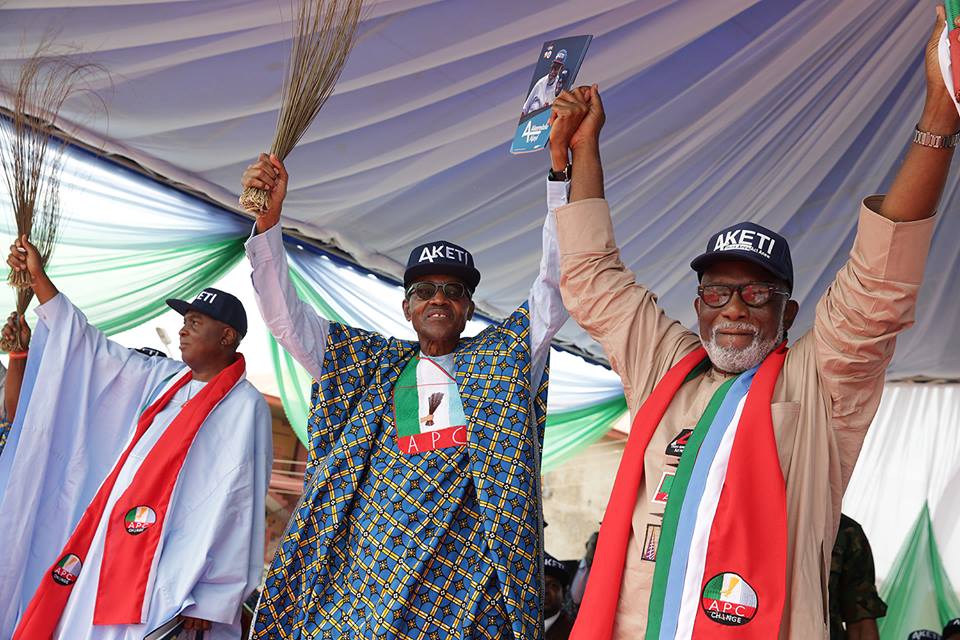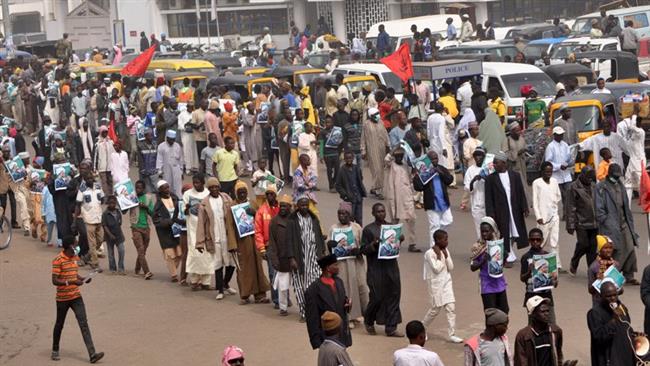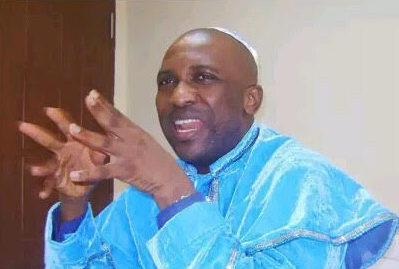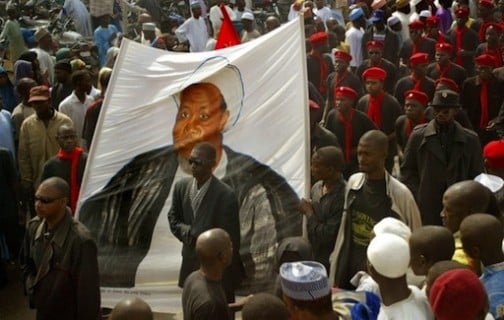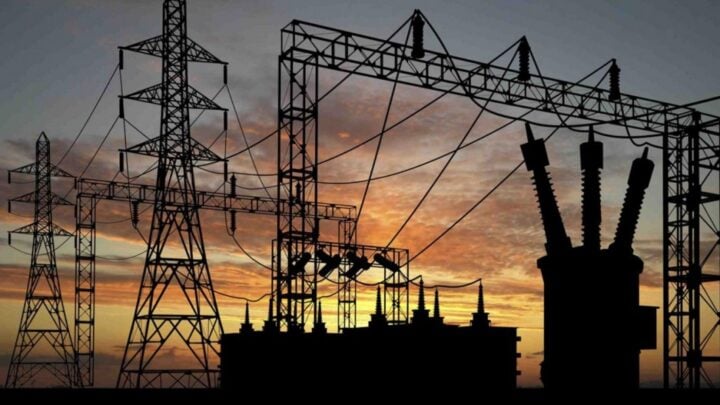BY GBOYEGA AKINSANMI
Next Saturday, the people of Ondo State will exercise their rights in a historic election, which has already left the electorate disenchanted.
The stage has been set for the next governorship poll in Ondo State. Already, the Independent National Electoral Commission (INEC) had released a list of 30 political parties, which it said, had presented candidates for the contest. Of the 30 parties, only the Alliance for Democracy (AD), All Progressives Congress (APC) and Peoples Democratic Party (PDP) are the forces to reckon with.
From all indications, the three political parties share one common trait: they are plagued with intractable internal crisis. By implication, the leading parties are internally divided at different levels, a condition that has thrown up legal actions that might threaten the political future of any party that wins the poll. And behind the rift is the conflicting interests of the political gladiators and their allies.
What appears incomprehensible is the failure of the party leadership to resolve their internal conflict and go to poll undivided. Perhaps, the conflict management mechanisms of the parties have not yielded much outcome, especially in the cases of the APC and PDP, which have been engaged in legal actions, which according to documents, are challenging the process through which their flagbearers emerged.
Whatever might be the factors and forces tearing the parties apart, INEC has already confirmed Mr. Rotimi Akeredolu as the APC candidate; Mr. Jimoh Ibrahim as the PDP flagbearer and Mr. Olusola Oke as the AD nominee. But Mr. Eyitayo Jegede, whom INEC first accepted as the PDP candidate, might reclaim the ticket if the Court of Appeal eventually decides in his favour.
Advertisement
THE POLITICAL DYNAMICS
Beyond internal crisis that cast pall on the electoral future of the APC and PDP in the contest, political gladiators are indeed working at cross-purpose at both ends. In the APC, for instance, the Akeredolu candidature did not receive much support from its National Leader, Asiwaju Bola Ahmed Tinubu. It did not receive Tinubu’s support because the process that produced him was allegedly flawed.
But the APC constituted an appeal committee to look into the complaints of the aggrieved aspirants. After a thorough review, the committee recommended that the process be cancelled. But the National Working Committee (NWC) rejected the committee’s report and nominated Akeredolu as the APC flagbearer, whom other aspirants argued, did not win the September 3 preliminary election.
Advertisement
As a result, the decision of the NWC had stoked disapproval among the aggrieved aspirants, especially Mr. Olusegun Abraham, Sen. Ajayi Boroffice and Mr. Olusola Oke. It compelled Abraham to initiate a court action in which he lay claim to the APC ticket.
Dissatisfied with the decision, Boroffice remained in the party, though grossly displeased. But Oke defected to the AD to realise his aspiration.
So, the emergence of Akeredolu has deepened division in the rank of the APC leaders at different levels. On the one side, the Akeredolu candidature had pitched Tinubu against the APC National Chairman, Chief John Odigie-Oyegun for failing to implement what the appeal committee recommended. It was a clear reason Tinubu called for Oyegun’s resignation citing his failure to be unbiased.
The Akeredolu candidature equally pitched Tinubu against the Minister of Solid Minerals Development, Dr. Kayode Fayemi, his Power & Works counterpart, Mr. Babatunde Fashola, Ogun State Governor, Sen. Ibikunle Amosun and the APC National Legal Adviser, Dr. Muiz Banire among others. For some South-west leaders, they allied with some external forces to undermine Tinubu’s interests.
On the other side, it is believed that the northern political elements are unduly interfering in the politics of Ondo State. But their perceived interference, some south-west leaders argued, is to decimate Tinubu’s political influence in the APC, and this has equally influenced a thinking that there might be a replay of what culminated in the 1964 and 1983 electoral crises if the plot against Tinubu continues.
Advertisement
For the leaders that share this view, some northern elements like Kaduna State Governor, Mallam Nasir el-Rufai, his Sokoto counterpart, Alhaji Aminu Tambuwal, the Minister for Justice and Attorney-General of the Federation, Mallam Abubakar Malami and core members of President Muhammadu Buhari’s kitchen cabinet are allegedly working to enforce the northern interest on the Ondo people.
In its own case, the PDP is largely polarised between its National Chairman, Sen. Ali Modu Sheriff and Chairman of Caretaker Committee, Sen. Ahmed Makarfi. While the Sheriff faction presented a business mogul, Mr. Jimoh Ibrahim to INEC, the Makarfi nominated the state Commissioner for Justice and Attorney-General, Mr. Eyitayo Jegede. But the INEC only accepted the nominee of the Sheriff faction.
Even though INEC has accepted Ibrahim, the court remains the final arbiter. Already, Jegede has approached an appellate court, challenging the decision of the trial court that nullified its candidature. In truth, the battle is not really between Ibrahim and Jegede. It is purely between Sheriff and Makarfi, though the Ondo poll offers them to test the legality of the process that brought to office.
OLUSOLA OKE
Advertisement
Of the three leading candidates, Oke is the only one relatively free from legal battle for now. Initially, the AD National Legal Adviser, Mr. Kehinde Aworele challenged Oke’s candidature in the light of Article 21.4 of the AD Constitution. The article requires that any governorship candidate must be a member of the party for at least six months before he or she can emerge the party flagbearer.
However, Aworele explained why he withdrew the court action challenging Oke’s eligibility. He said he discontinued the action to avoid anything, which he said, might affect the victory of the AD flagbearer. So, he said the party leadership “did not want a situation where there would be a petition against his eligibility after the election. There is no crack in the walls of the Alliance for Democracy.”
Advertisement
But Oke did not defect to the AD initially. After he fell out with the APC, Oke sought to realise his aspiration in Action Alliance (AA). But due to the interference of the northern element in the Ondo politics, the South-west leaders persuaded Oke to contest on the AD platform. So, Oke was asked to defect to the AD because it originated from the South-west and people could easily identify with it.
Across the South-west, the AD leaders have already rallied around Oke. Similarly, the Oke candidature received support in the rank of the South-west leaders, especially after Jegede suffered setback. Aside that the AD and the key leaders in the region accepted his candidature, Oke had been able to garner support from the PDP. Being former PDP National Adviser, Oke had gained much ground in the PDP circle, which according to reports, might swing the state’s electoral pendulum towards him. The popularity of Oke is growing wide and wild.
However, the Rotimi Akeredolu Campaign Organisation had alleged that the political lieutenants of Tinubu “are working for Oke.” After he issued a statement calling for Oyegun’s resignation, Tinubu had refused to talk about the Ondo election. To demonstrate his neutrality, the APC national leader had travelled out of Nigeria to avoid a situation, which one of his loyalists said, might link him to the Ondo politics.
Advertisement
ROTIMI AKEREDOLU
For many party faithfuls, the Akeredolu candidature is the best thing to happen to Ondo State, especially when they reflect on the governance records of the incumbent, Dr. Olusegun Mimiko. Those who share this view always refer to Akeredolu’s stewardship as the President of the Nigeria Bar Association (NBA) and his roles in pursuing election petitions for the defunct Action Congress of Nigeria (ACN).
Advertisement
But the process through which Akeredolu emerged as the APC candidate is still an albatross. Also, the roles the northern elements played in his emergence has already created an image crisis for him. In the South-west, the roles Tambuwal, el-Rufai and Malami among others are playing to force northern interests on the Ondo people is widely treated with utmost disgust and suspicion.
After using Tinubu to realise the Buhari presidency, the South-west leaders believe, these northern elements have, among others, found new allies in Amosun, Fayemi, Fashola and Banire. As the Chairman of the Olusola Oke Campaign Organisation, Hon. Bola Ilori alleged, the new allies have been working with the INEC and the courts “to force the northern candidate on the Ondo people.”
Even in the rank of Afenifere, the new allies of the northern political establishment has already been tagged the agents of Fulani. That is why the National Publicity Secretary of Afenifere, Mr. Yinka Odumakin described the northern interference in the Ondo politics as an affront on the hegemony of the South-west. For an Afenifere chieftain, Chief Ayo Adebanjo, the plot against Tinubu is a ploy to divide the Yorubaland so that the northern oligarchic powers can take over the South-west.
Apart from undue interference from the northern political establishment, Abraham is already in court, challenging the process that produced Akeredolu. He has kept faith with the APC. He has relocated to his political base in the Ondo North. He holds regular political meetings with his supporters, which according to reports, has been a source of concern for all opposition parties and his political opponents.
JIMOH IBRAHIM
The emergence of Jimoh Ibrahim is indeed a key factor in the Ondo politics. It is a factor not because Ibrahim can garner much support that can swing the pendulum of electoral victory on his side.
However, it is a factor because his emergence reordered the contest for the Alagbaka House. It is equally a factor because his emergence undermine Mimiko’s plan to install Jegede as his likely successor.
Even though the trial court decided in his favour and INEC accepted his nomination, the Ibrahim candidature has not gained much support. Two reasons explain Ibrahim’s feeble political campaign. First, Ibrahim practically came into the race about five weeks to the election. He entered into the race effectively after the court declared him as the authentic candidate of the PDP on October 14.
Second, Ibrahim does not have strong political structure in the state. And the PDP structure he could have relied on is already fragmented and is firmly in the grip of Mimiko, thereby making Ibrahim a political weakling. However, whether the Ibrahim candidature will stand at last is still a subject of litigation pending before an appellate court. Either it stands or not, it has wreaked havoc on Jegede’s candidature.
Whatever might be the decision of the appellate court at last, the decision of the trial court had already crashed the campaign, which Odumakin condemned in strong terms. He said the plan to use federal might “to enforce unpopular will over popular will in Ondo State will not stand. If this continue, the Ondo people will react at the appropriate time. If this continues, I foresee the 1964 and 1983 crises again.”
EYITAYO JEGEDE
Even though a plethora of court actions are pending before the Court of Appeal and the Supreme Court, Jegede is much hopeful. He has not suspended his campaign because the electoral umpire has replaced him. As though he was confident of victory, Jegede had been moving from local government local government, soliciting for people’s support ahead the November 26 election.
Jegede’s campaign was reinforced last week when Bayelsa State Governor, Mr. Seriake Dickson led other the PDP leaders to canvass support him. Also with Dickson were, among others, Sen. Makarfi, Ekiti State Governor, Mr. Ayodele Fayose and the PDP spokesman, Hon. Dayo Adeyeye. Considering a horde of supporters that converge on the Akure Dome, the venue of the rally, it is definitely a testament to Jegede’s popularity in Akure and Mimiko’s control of the PDP structure.
At the rally, Adeyeye told the party faithful that Jegede “is the PDP candidate. There is no controversy about it and any other person parading himself is a counterfeit. Jegede’s name is already with the INEC and will be presented on November 26. The officers of the Nigeria Police and the Directorate of the State Security Services all monitored the whole process where he emerged in Akure.”
But that is mere political rhetoric. Only the court can reverse the prevailing order. Aside, it is a national battle, which has grave implication for the state politics. So, whichever faction of the PDP the court declares authentic at last has the power to make valid governorship nomination, not only in Ondo State, but also in other states of the federation until the PDP duly organises its National Convention.
One message was clear at the Akure rally: the people of Akure, where Jegede hails from, wanted their own son to rule the state. That has been the push of almost all traditional rulers from Ondo Central, especially Akure North, Akure South, Ondo East, Ondo West, Idanre and Ifedore.
However, the push for Jegede has been rejected in other senatorial districts in the state because it is believed Ondo Central cannot produce governor for 16 unbroken years.
THE ELECTORAL CONTEST
Now that the political space of Ondo State has largely been reconfigured, the November 26 poll is a straight contest between Akeredolu, Oke and Jegede/Ibrahim. In truth, three reasons will determine who the Alagbaka race at last. First, the people of Akoko may eventually cast a protest vote against APC except Abraham and Boroffice openly come to endorse the candidacy of Akeredolu.
As the state is configured politically, there are six local government areas in Ondo North. At large, Ondo North has 418,926 registered voters representing 27.1 percent. Of the six councils, Akoko zone alone, where Abraham and Boroffice come from, has four. Also, Owo zone, which Akeredolu’s political base, has just two. Oke picked his running mate, Mr. Gani Dauda from Akoko, whose people still believe, were politically raped with the APC refused to implement the report of its own appeal committee.
Second, with its 615, 157 registered voters representing 39.78 percent, Ondo Central is mainly the stronghold of the PDP. Also, it is Mimiko’s political base. But the emergence of Ibrahim has changed the political calculation. Akure is a factor in Ondo politics. Since the creation of Ondo State in 1976, Akure has not produced a democratically elected governor. Before he was replaced, Jegede’s candidacy offered them much hope.
Like the case of Akoko, consequently, the people of Akure may cast protest votes against the APC because it is largely believed that federal might was allegedly used to displace Jegede, who they believe, would be the first son of Akure to be a democratically elected governor. Akure zone, which comprise Akure North and Akure South, has 302, 888 registered voters, almost half of the voting strength of the Ondo North.
Also, there may be protest votes against the APC at Ondo West and Ondo East, Mimiko’s political enclave. While the former has 150,838 registered voters, the latter has 37,469. In this zone, the people alleged the Buhari presidency “is working against Mimiko because of the roles he played to ensure that former President Jonathan was reelected.” Both Idanre and Idanre are still deemed Akeredolu’s stronghold.
Even though Ibrahim hails from the Ondo South, Oke remains a force to contend with. It is, also, the senatorial district, where Akeredolu picked his running mate, Mr. Agboola Ajayi. But the choice of Ajayi has generated disapproval across the state. First, Ajayi is Akeredolu’s maternal cousin, which breeds a feeling that there is a grand plan to privatise the government of Ondo State.
Second, Ajayi has a strong affiliation with the Niger Delta militants, a situation which has caused ill feelings. In its own case, Ondo South has 511,998 registered voters, which represents 33.12 percent of the state’s voting strength. Oke still holds the ace in the south. Aside, Oke has emerged as the leader of the Olusegun Agagu political dynasty, which largely determines the voting patterns in the south.
Between now and Saturday, however, there may be a political realignment that will largely determine who wins the Alagbaka race. Undoubtedly, one key factor will drive the would-be political realignment: it will depend on the decision of the appellate court, which Jegede has approached to reclaim the PDP ticket. If the court upholds Ibrahim’s candidacy, it will breed a realignment against the APC.
Culled from THISDAY
Views expressed by contributors are strictly personal and not of TheCable.
Add a comment
